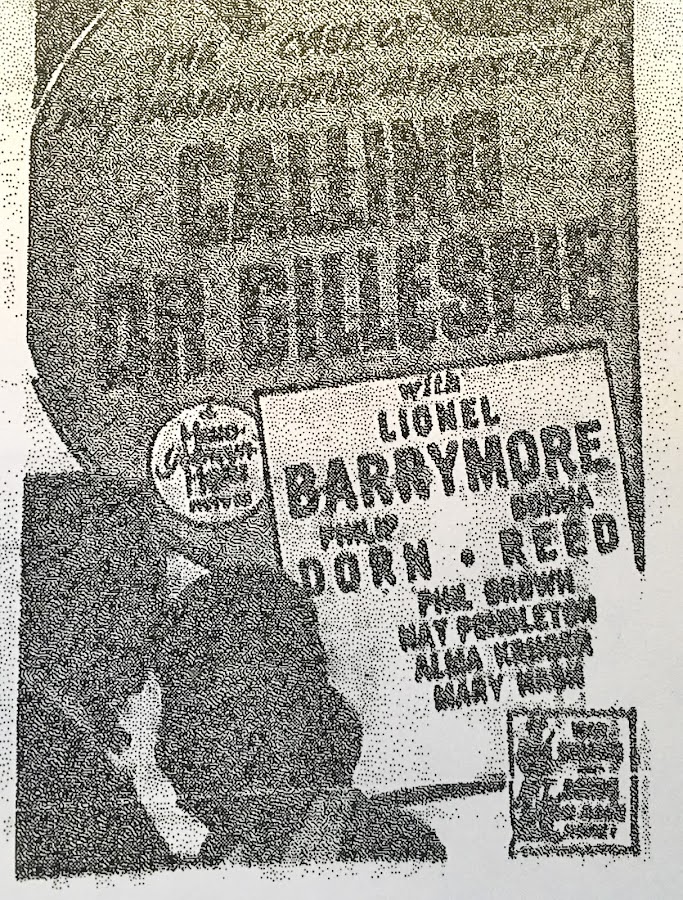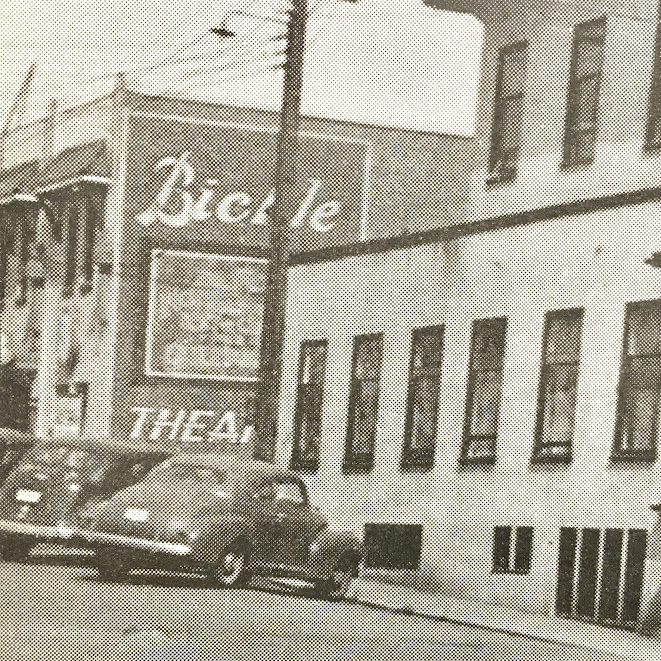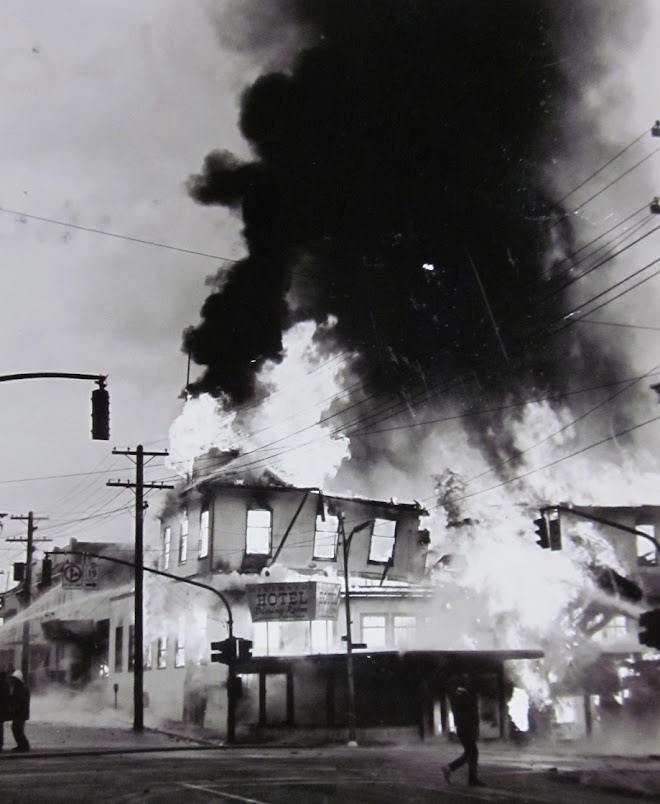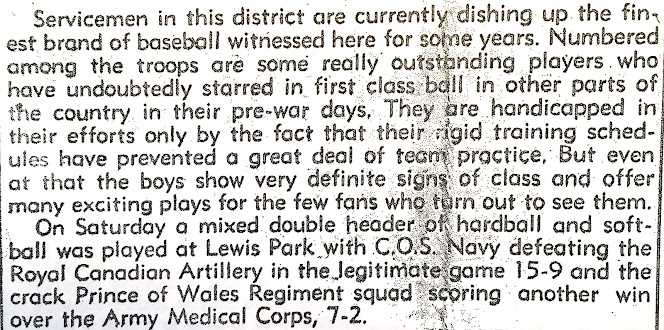Canadians in Combined Ops Land Safely at HMCS Givenchy III
News Files 1943 - 45: Context, Setting, Names, Duties and More
Five Canadians in Combined Ops head to Vancouver Island, 1944
L - R: Don Linder, Kitchener; Doug Harrison, Norwich, Joe Watson, Simcoe;
Buryl McIntyre, Norwich; Chuck Rose, Chippawa
Navy base (HMCS Givenchy III 1943-46) is now called HMCS Quadra
Entries from Doug Harrison's WWII navy records
Introduction:
I took the train to Vancouver in 2012 (then ferried to the island), flew directly to Comox in 2014 and 2015, and want to return soon for another walk around the navy base, now called HMCS Quadra (for training of cadets). I think there is more information to be found (Maybe some good photographs!) concerning the World War II activities of scores of Canadians who were members of RCNVR and Combined Operations.
While in Comox and nearby Courtenay I took hundreds of photos of my own and collected hundreds of news files from hardcopies and microfiche files of local newspapers. And in this series of posts I will share items that help readers understand better the role of certain Canadians who had spent about two years overseas (training for, participating in the Dieppe Raid, the invasion of N. Africa in 1942, and the invasions of Sicily and Italy in 1943) before returning to Canada for further service in RCNVR/Combined Ops - this time in Canada's only Combined Operations School (COS).
Below readers will find several items from the Comox District Free Press as found at the Courtenay Library, situated as I recall about one block south of Main Street.
"I'll take that roll and that roll. Be back in a few hours!" GH
Invasion barges are long gone but some of their history remains
Photo - from the Comox Valley Record, June 6, 2013
The Bickle Theatre was behind The Riverside Hotel in Courtenay and behind it was a large dance hall. Of those three places, all of which were frequented regularly by Canadian sailors, only the dance hall remains. Photos of the dance hall will be shared farther along in this post:
From Comox District Free Press, Nov. 1942. I write "trial
print" in my notes. I see I needed to lighten up the settings.
I have better luck with a movie poster's settings!
Photo credit - Click here for more details
In the following photo, one sees The Riverside Hotel with the Bickle directly behind it. The dance hall is not visible:
Photo Credit - Courtenay and District Museum and Archives
Behind the hotel was a laneway or back alley, and some of the hotel rooms on the ground floor had windows that looked out onto the alley. WWII sailors found a way of getting cheaper rates because of that lane. My father writes the following:
Room 14 had a low window which faced onto an alley and late Saturday night and early Sunday morning after a long night on the town, many sailors retreated through the window to sleep wherever space was available, piled like cordwood, as many as 12 in a room for two.
In the morning, when we had to sign out of the room, it would have made some sense if a few had again retreated out the window, but oh no! Everyone had to file out past the desk clerk whose head moved back and forth like someone watching a tennis match. The management of the Riverside remained nice to us however, and in due time we quit taking advantage of their good nature - that was enough of a good thing. "Dad, Well Done", page 127
In 2012, when I visited Courtenay, I met Howard Burns, local historian, and he happened to be Deputy Fire Chief when the Riverside Hotel burned down many years ago. He shared the photo below and a few others, and I am sure my father would have cried real tears had he seen them:
The 1942 construction of the hall predates the arrival of Canadians in Combined Ops (i.e., the group that included my father in Jan. 1944) after their two years of overseas service but it is very likely they made good use of its services. In fact, this article reveals there may be a way to prove that they used the hall:
In 2012, when I visited Courtenay, I met Howard Burns, local historian, and he happened to be Deputy Fire Chief when the Riverside Hotel burned down many years ago. He shared the photo below and a few others, and I am sure my father would have cried real tears had he seen them:
Photo - Courtesy of H. Burns, 2012
In the July 1st, 1943 issue of the Comox District Free Press one can read a lengthy article re the origin and uses of the Canadian Legion Hall at Comox. A few excerpts follow:
I share the following two paragraphs because it reveals the positive, long-lasting link between veterans and their hall (and thus the headline: "On The Cold Atlantic Sea, They Still Remember Comox"):
The Legion Hall in Comox appears in two photos taken in 2012. White building w blue roof seems to match its natural surroundings:
Photos GH
In the July 15, 1943 issue of Comox District Free Press and under the headline "ALLIES Smash at AXIS Around The Globe" we read the following subhead:
The words 'Anglo-Canadian Force Storms Catania While Bombers Blast Messina', re the invasion of Sicily beginning July 10 (aka Operation Torch), reveals a significant action. British forces (Monty's Eighth Army) stormed Sicily on its eastern coast. The Canadian Army stormed Sicily on its southern coast, south and west of the Eighth Army. A map from Combined Operations by Londoner Clayton Marks reveals the action at Sicily SE corner:
Comox is in the background, left. Dad (centre) is taking a break!
Some of the action related to the invasion of Sicily is below:
From Comox District Free Press, $1.50 per annum by mail in 1943
Photo - From Combined Operations by C. Marks, London
Wanna dance? Got burning feet after the dance? Two items from the Free Press seem to go together:
The Native Sons Hall, the largest building of its kind in Canada, still stands not far from where the Riverside Hotel and Bickles Theatre once stood:
Also from July 15, 1943:
Doug Harrison sips a drink with a CWAC. Location unknown. GH
A news item from July 22, 1943 caught my eye because the photographer mentioned (Mr. Sillence) has negatives on file at the Courtenay Museum. Could this clue lead me to photographs of Canadian sailors?
Note to self: I left a note to myself in top corner. Another trip to BC?
In the July 29, 1943 issue of Comox District Free Press, General Montgomery praised the "magnificent soldiers" from Canada who joined his ranks in Sicily. The photo that was paired with the following caption was of very poor quality so a different one is shared below:
General Alexander (left), General Montgomery (right)
Photo Credit - Details at history of war
The August 12, 1943 issue of Comox District Free Press provides details about Sea Cadets that ends well, i.e., with "free ice cream all 'round, I say!":
"Goose Spit is home to... (a) Canadian Forces summer camp"
In the August 26th and September 30th issues of the Free Press (1943) we read about Navy baseball teams situated in the Comox and Courtenay region, known as "C.O.S. Ball Teams,"i.e., from the Combined Operations School. We can pick up a few more details as well, predating the arrival of oversea's sailors who also played a lot of ball from 1944 - 45:
Aug. 26, 1943; a catcher for COS (Maure or Mauro) is mentioned.
Vic Mauro is mentioned (front, left) on No. 1 Navy Ball Team (1944 or '45)
Navy #1 Team: Front: (L-R) V. Mauro, C. Rose, D. Harrison, B. Kidd, J. Spencer
Back: J. Ivison, J. Malone, W. Grycan, G. Hobson, D. Arney, D. Zink
From the collection of Doug Harrison (Dad), front and centre
More details re C.O.S. ball teams from Sept. 30, 1943
My father and mates arrived at Comox, Jan., 1944
We read the Navy team played "first class ball... the finest brand... handicapped by rigid training schedules." They "played at Lewis Park" and fans were treated to both "hardball and softball" games. I would assume that some of these qualities, handicaps, etc. carried over to future teams situated on The Spit, when the C.O.S. teams were in barracks at HMCS Givenchy III from '44 - '45.
Another look at Lewis Park. Photo as found at Comox site, on Facebook
Date unknown.
About that time my father writes just a few details related to the above:
...I was on the navy softball and hardball teams and we played as many as six games a week. Page 127
Doug Harrison writes more about his captain's sailboat, going to dances, having a beer in downtown Courtenay and eating oysters from a government oyster bed near his barracks than he does about baseball. I will drop in a few lines from his memoirs about those items as more clippings from the Comox District Free Press and other newspapers are presented.
Please click here for more details about the Comox and Courtenay region and its connection to Canadians in Combined Operations.
Questions and/or comments can be left in the comment section below or emailed to GH at gordh7700@gmail.com
Unattributed Photos GH








































No comments:
Post a Comment